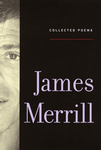|
|
 |
|
|
 |
 |
 |
 |
James Merrill was born in New York City on March 3, 1926, and lived in Stonington, Connecticut. He was the author of
twelve books of poems, which won him two National Book Awards (for Nights and Days and
Mirabell), the Bollingen Prize in Poetry (for Divine Comedies) and the first Bobbitt
National Prize for Poetry awarded by the Library of Congress (for The Inner Room, 1988). The
Changing Light at Sandover appeared in 1982 and included the long narrative poem begun with "The
Book of Ephraim" (from Divine Comedies), plus Mirabell: Books of Number and Scripts
for the Pageant in their entirety; it received the National Book Critics Circle Award for poetry
in 1985. In addition to the one-volume edition of his narrative poem The Changing Light at
Sandover, he also issued two selected volumes: From the First Nine, Poems 1946-1976 (1982)
and Selected Poems 1946-1985 (1992). He was the author of two novels, The (Diblos)
Notebook (1965, reissued in 1994) and The Seraglio (1957, reissued in 1987), and two plays,
The Immortal Husband (first produced in 1955 and published in Playbook the following
year) and, in one act, The Bait, published in Artist's Theater (1960). A book of essays,
Recitative, appeared in 1986, and in 1993 a memoir, A Different Person. His last book of
poems, A Scattering of Salts, was published in 1995, following his untimely death on February 6
of that year.
|
|
 |
 |
 |

|
|
This book brings together a remarkable body of work in an authoritative edition. From Merrill's
privately printed book, The Black Swan, published in 1946, to his posthumous collection, A
Scattering of Salts, which appeared in 1995, all of the poems he published are included, except
for juvenalia and his epic, The Changing Light at Sandover. In addition, twenty-one of his
translations (from Apollinaire, Montale, and Cavafy, among others) and forty-four of his
previously uncollected poems (including those written in the last year of his life) are gathered
here for the first time.
"The lyrics in Merrill's Collected Poems ought to last as long as people still care about poetry . .
. poetry as alive as Merrill's is why people care." -- David Gates, Newsweek
"Gigantic and ravishing . . . What this new volume provides, not without a small shock even to
those familiar with Merrill, is the size and scope of his accomplishment . . . [A] monumental new
collection." -- Daniel Mendelsohn, New York Times Book Review
"Merrill . . . has been well-served by his executors and editors, McClatchy and Yenser . . . [In
this collection] there's more than enough--in humor and sorrow, in tones of voice, in diction, in
subjects--to keep one engaged for days, for years, for life. Reading Merrill is like reading
Marvell or Keats or Dickinson; having his lines in mind is that unique thing, a voice that says
somebody was here before." --Caroline Fraser, L.A. Times
"The Collected Poems . . . sensitively edited by JD McClatchy and Stephen Yenser . . .
represents a major literary event." -- Edmund White, Out Magazine
"If you like poetry composed (in Hopkin's words) in 'the current language heightened,' Merrill
will please you . . . If you have despaired of finding words subtle enough for all that goes on
between lovers over time; if you are delighted by poetic invention, Merrill will please you. If you
are eager for a window into the pangs and pleasures of gay existence, or if you want to know
what a person of ever-attentive receptivity might have seen between 1926 and 1995, Merrill will
please you. Above all, if you value lightness of touch, Merrill will please you . . . The weight of
the wreath is heavy on all poets, but Merrill rarely allowed the weight to be felt, or the wrinkles to
show." -- Helen Vendler, The New Yorker
���
|
|
 |
|
|
|




